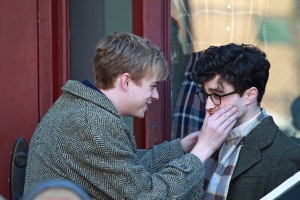
A large number of writers have been credited with the phrase “kill all your darlings.” I had always thought it was Dorothy Parker, and the Internet claims it is William Faulkner or Stephen King. A recent Slate article places its origin as a writing guide from 1913. Whoever said it first, it’s been a key piece of advice for writers for decades. Get rid of your most precious, pretentious, silly, extravagant passages, sentences and scenes. Kill them, your darlings. In Kill Your Darlings, John Krokidas and Austin Bunn’s wonderful film about the beginnings of the Beats, it is spoken by an English professor with the usual purpose, but it also means a great deal more. It is also about getting rid of your personal pretensions, petty moralities, tradition, constraints and fears. And actual murder. One of the first scenes in the film is Lucien Carr (Dane DeHaan) holding the dying body of David Kammerer (Michael C. Hall), who Carr had called his guardian angel and who had been stalking him for years and who Carr stabbed before sinking him into the Hudson River.
The rest of the film is the story of what leads up to this moment, and it heavily centers on Alan Ginsberg’s relationship with Carr, and with their friendships with Jack Kerouac and William Burroughs. This is in 1944 and 1945, before Ginsberg (Daniel Radcliffe) became one of the great poets of the 20th century, Kerouac (Jack Huston) wrote On the Road and inspired a hundred million hipsters, and Burroughs (Ben Foster) wrote Naked Lunch and killed his wife. As a nervous freshman at Columbia, Ginsberg meets the irascible, incandescent and brilliant Carr, who takes him to Greenwich Village and introduces him to Burroughs, Kammerer, other writers, artists, drunks, and to drugs. Ginsberg falls in love with Lucien, whose sexuality is not entirely clear. Lucien’s ecstatic interest in the possibility of a new art movement draws Kerouac, Burroughs and Ginsberg together.
They get wasted and expand their minds and develop the ethos that would define the Beats. Meanwhile, Ginsberg’s mother (Jennifer Jason Leigh) is institutionalized, Kerouac fights with his girlfriend and Kammerer becomes increasingly unhinged. As nonfiction films go, Kill Your Darlings is rather nonfictional; Krokidas and Bunn only make a few changes to history for dramatic purposes. That it’s this authentic makes the story all the more amazing. Famous people meet other famous people because they’re famous, but rarely do literary titans become friends before any of them had published a word, and they usually don’t do it in the midst of a gay stalker murder.
Krokidas and Bunn’s screenplay, based on Bunn’s story, does the Beats justice by featuring lyrical, kinetic and occasionally very funny dialogue and by not over-praising figures who have been lionized by readers for sixty years. These are deeply flawed men, and not just Carr. Krokidas directs the formal scenes with precision and clarity, and when he is innovative, depicting the creative thought processes or drug-induced imaginations, he succeeds. I think they tried to do too much with the film, both thematically and narratively, but that’s a minor problem that may have more to do with telling the story of extraordinarily interesting people and only have two hours to do it.
They are helped immensely by a rather extraordinary ensemble. Daniel Radcliffe has shed the Harry Potter skin completely with this very brave turn as Ginsberg; he may not look anything like the poet, but he plays nervous, needy charm impeccably and delightfully. DeHaan’s Carr is intense and unnerving, and while he seems to do much the same thing in every role (from Chronicle to The Place Beyond the Pines), he does it very, very well. Hall is both menacing and sympathetic, and Foster make a too-small role loom large in my memory with mannered, nearly hammy line readings. I’m glad no editor decided to kill that darling.
Q&A with Austin Bunn, who wrote Kill Your Darlings with John Krokidas.
Ted Gideonse: From what I’ve read, you’ve been working on this story for a long time – since at least you were in grad school. What drew you to this particular tale of the Beats and to focusing particularly on Ginsburg? There’s a lot of queerness to the Beats, but this story is pretty gay.
Austin Bunn: I always say Ginsberg got me through my freshman year of college. I used to go to the bookstore and read the Ginsberg collections like they were some transmission from this future version of myself. They were so honest and unabashed and brave in all these ways I wanted to be as a closeted, young creative writer for New Jersey. And, as most fans know, you can’t just read a little of the Beats. From Ginsberg, I got into Kerouac, then Burroughs and then all the bios, and the murder of David Kammerer appears as an anecdote in several of them. That lead me to looking up the murder in the New York Times on the microfiche at the NYPL (yes it was that long ago) and it was front page news in 1944. (“Columbia Student Silent On Slaying of Friend” was the headline – the article at the end of the picture is the real one.)
It just seemed to me the idea – the contradiction, really – that one of my gay idols was involved in defending his best friend in what was effectively a hate crime against a “known homosexual” (the word appeared in the New York Times for the first time in 1943) made for a compelling dramatic riddle. The real mystery was why nobody had thought to bring it to dramatic life yet. I mean, three of the most beloved artists of the 20th century involved in a murder of a gay man? It hit close to home.

A lot has been made of casting Daniel Radcliffe. The rest of the cast are known character actors, but not big blockbuster stars best known for CGI work and being cute. He’s great in the movie, but it was certainly a risk. How did you feel about casting him?
Approaching Dan was really John’s idea, the director and co-writer (and my college roommate). Allen at this point in his life was a dutiful son, looking to step out from his dad’s shadow and show the world what he was capable of. Like many great artists, he had this compelling mix of ambition and total confidence along with profound self-doubt. John saw in Dan much of the same – a young man desperate to prove that he was different from the way anyone thought of him.
Honestly, I always thought Dan was a genius choice, but the financiers, initially, didn’t. They didn’t think audiences would want to see Dan independent of the Potter franchise. As John says, they told him “People only want to see Dan with a wand in his hand,” and he said, “Oh I’ll put a wand in his hand.” Plus, Woman in Black opened just as we were going into production and that film is effectively the Dan Radcliffe show, and it made $20 million its opening weekend. That answered that question.
MOVIE REVIEW
Kill Your Darlings
Directed by John Krokidas
Written by John Krokidas and Austin Bunn
Starring Daniel Radcliffe, Dane DeHaan and Michael C. Hall
Rated R
Opens Oct. 25 at Landmark Hillcrest











